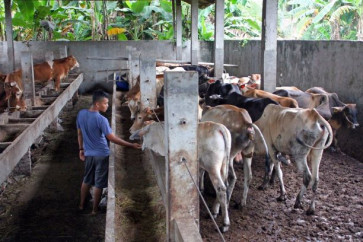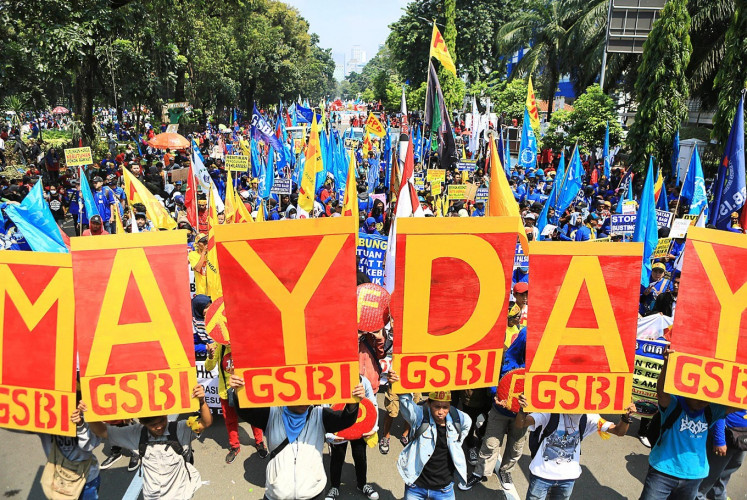The imminent death of Banyuwangi's Using language
âTiada bahasa, bangsa pun hilangâ (Without a language, a nation is lost), so goes the catchphrase of national hero Muhammad Yamin
Change text size
Gift Premium Articles
to Anyone

'Tiada bahasa, bangsa pun hilang' (Without a language, a nation is lost), so goes the catchphrase of national hero Muhammad Yamin.
As we commemorate the Youth Pledge of 1928, when our founding fathers declared Indonesian the unifying language, the future of the almost one million Using language-speaking people of Banyuwangi in the eastern tip of Java is at stake.
Banyuwangi in East Java is known for its unique culture, which seems to have been uprooted from elsewhere compared to the neighboring regencies.
The traditional music, rituals and language are totally separate from the rest of Java's regencies.
Its literature, mostly in the spoken form of poetry, features widely in rituals such as the (trance dance) Seblang, or the erotic Gandrung dance, and is uttered in the Using language. And even charmed spells, locally known as santet, for which Banyuwangi is famous, are in the Using language.
Thanks to die-hard supporters, among others the late Hasan Ali, the local Using language has been officially learned in classrooms since 2007. Ali, the father of popular singer-cum-senator Emilia Contessa, also wrote a local 24,000-word Using-Indonesian dictionary and a book on Using grammar.
The Using language, which was initially considered a dialect of the Javanese language, has been identified as a language of its own since 1987. Udayana University lecturer Suparman Herusantosa in that year wrote a thesis entitled 'Using Language in Banyuwangi Regency', for his doctoral degree from the University of Indonesia in Jakarta.
Herusantosa said that the Javanese and Using languages genealogically shared the same roots. After studying words in the Using language and Javanese, he found that the two languages came from the same roots but had developed on their own separate courses.
But dark times linger over the fate of the Using language. Gubernatorial Decree No. 19/2014 issued in April this year states that the government recognizes only two local languages in East Java: Javanese, spoken in the middle and western parts of East Java, and Madurese, a language spoken on Madura Island and in the regencies of Jember, Bondowoso and Situbondo, and along the northern coastal area of the province.
The two local languages will be the only ones to serve as mandatory local languages taught in schools.
The decree defies an earlier recommendation from the Congress of Javanese Language in October 1996, which stated that, in principle, the Using language may be taught in schools as a local language.
The recommendation was signed by Atlan, then head of the provincial education and culture agency.
The Regional Legislative Council issued a similar recommendation, which promoted the Using language as part of the curriculum. Even the Education and Culture Ministry in Jakarta has permitted the teaching of the local language in schools.
Using language is the soul of the Using people, who consider themselves separate from their Javanese cousins. Geographically, Banyuwangi is separated from other Javanese regencies, with Baluran forest in the north, the Ijen mountains in the west, Kumitir forest in the south and Bali Strait to the east.
Blambangan, an ancient kingdom in the area now called Banyuwangi, was known for its fierce resistance to both the Dutch and the Mataram kingdom of Central Java. The Dutch colonial rulers brought in thousands of people from Java and Madura to fight the Banyuwangi people.
Their refusal to cooperate with the Dutch once created a derogatory term, 'Using', which means 'no'. From then on, the Dutch labeled the locals as 'Usingers'.
The geographical situation has created isolation. Unlike the Javanese language, which has structural functions to address people of different social ranks, Banyuwangi's Using language remain egalitarian without any 'polite form'.
In its cultural performances, Banyuwangi's culture does not draw a line to separate its art forms, unlike Javanese culture, which differentiates between the refined art of the palace and the art of the common people. Banyuwangi gamelan (traditional musical instrument) runs very fast compared to the slow style of Java's gamelan.
The most recent gubernatorial decree has sparked an outcry from several prominent figures in Banyuwangi. One of them is Hasnan Singodimayan, who says the days of the Using language are numbered.
'Once it is ousted from schools, the people of Using will soon be wiped out. The culture will not survive without its language,' says Singodimayan, who is also a leading novelist and guardian of Banyuwangi's culture. Without any help from the local government, the language will soon be neglected and forgotten. 'The decree will speed up the process.'
The death of Gandrung, and other rituals, such as the Seblang trance dance and Kebo-Keboan is also inevitable, simply because they use the Using language.
____________________
The author is co-writer of the first bilingual Using-Indonesia novel Nawi BKL Inah. His other books in the Using language are Isun Dhemen Basa Using (I Love Using Language) and Markas Ketelon (The Third Headquarters).









